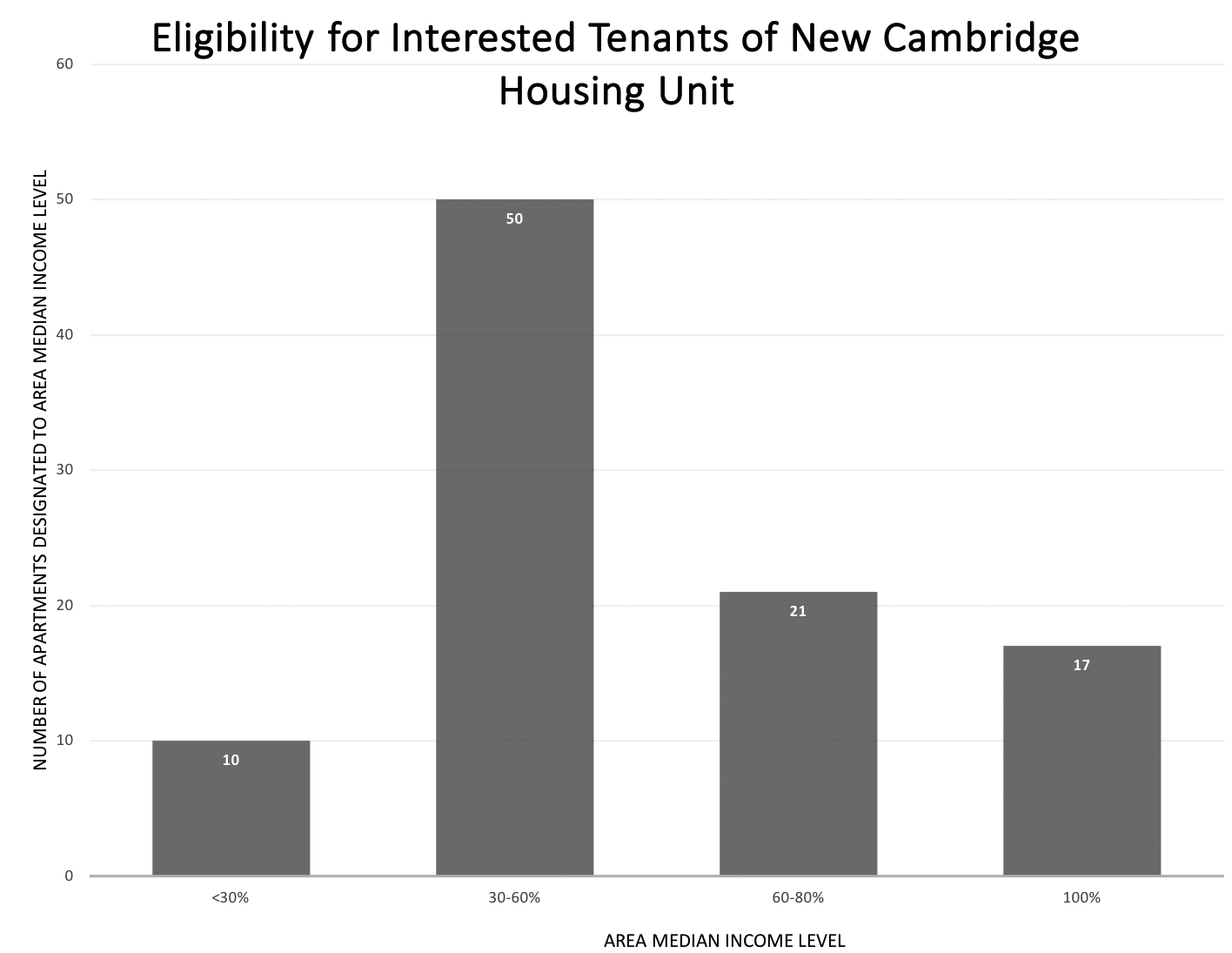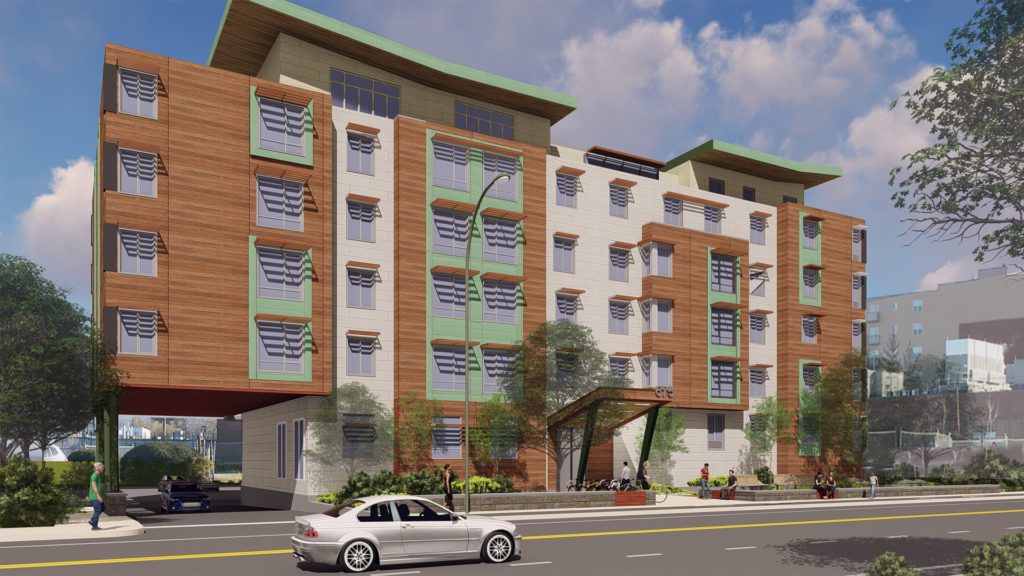New housing development will provide affordable homes in Cambridge
October 18, 2018
A new affordable housing development in Cambridge is set to open 98 new housing units by early 2020.
Homeowner’s Rehab, Inc., or HRI, developed the project to address the need for low-income housing. Called Concord Highlands, it will be the largest affordable housing development in Cambridge in the past 40 years.
“Obviously there’s a huge need in Cambridge, in Boston, in the Metro Boston area for more affordable housing,” said Rebecca Schofield, a project manager at HRI. “Definitely affordable housing for families, affordable housing with commuter transit.”
The new development will be built at 671 to 675 Concord Ave. According to an email sent to The News from Homeowners Rehab Inc., 60 of the 98 apartment units are eligible for households earning 60 percent of the Area Median Income, or AMI — a marker of the middle income of what members in a community make. Ten of those units are reserved for households at or below 30 percent AMI. 21 of the remaining units will be for households earning between 60 and 80 percent of the AMI, and the final 17 units are for households with up to 100 percent of the AMI.
Schofield said that affordable housing projects generally face a number of struggles throughout the construction process, including cost and the long wait times for permitting that projects must undergo.
The site was obtained by HRI in December 2016. Workers began to lay the foundation in June, while the building saw its official groundbreaking on Oct. 5. Schofield said this is “as quick as it could possibly have gone.”
“We were funded in kind of record time for a project of this size, and a lot of projects have to wait much longer to go through different state rounds,” Schofield said.
Part of what helped move the project along quickly, Schofield said, was the support it received from the city.
“To date, Concord Highlands has received major financial support from the City of Cambridge, the Massachusetts Housing Finance Agency, the Massachusetts Department of Housing and Community Development, or DHCD, and TD Bank,” HRI wrote in its press release. “The development’s broad range of affordability, as well as access to transit, and other community amenities, will greatly expand affordable housing opportunities in this neighborhood.”
The construction of HRI’s Concord Highlands development comes with the announcement by the Metropolitan Mayors Coalition — a group of 15 mayors from the urban core of the Metro Boston area — that they are increasing affordable housing construction goals to combat a growing demand for housing. In Boston, Mayor Martin J. Walsh outlined his housing goals in the city’s Imagine Boston 2030 plan.
On Sept. 26, Walsh announced an update of the city’s housing goals as the city’s population increases. Currently, about 675,000 people live in the city, but this number is expected to increase to 760,000 by 2030.
“To house this increased population, Boston’s housing production goal must increase from 53,000 units to 69,000 new units by 2030,” the city said in an updated plan.
Right to the City Boston, an alliance of community organizations focused on people of color and low-income communities, worries that the mayor’s plan is mismatched with the needs of residents. On Sept. 22 they held the Homes for All assembly to discuss proposed demands dealing with neighborhood input in new construction projects, changing the city’s zoning code to protect residents at risk of displacement and increasing the amount of truly affordable housing in the city.
“I believe that we are all here, because we envision a Boston where there is equal access to quality education, affordable housing, economic opportunities, accessible transportation, a healthy environment and public resources for all,” said Mimi Ramos, director of New England United for Justice, one of the organizations in the Right to the City Boston alliance, at the Homes for All assembly.
The assembly discussed a goal of homeowners, landlords and tenants “coming together as one Boston.” Citing a goal of bringing 10,000 people together to take action, Ramos cited low-income housing as a major issue they seek to tackle.
“Together, we can address one of Boston’s biggest problems, and it is the need for affordable housing in our community,” Ramos said.
According to a graph prepared by Keep It 100 for Real Affordable Housing and Racial Justice, under the mayor’s updated plan 5 percent of what is being built will go to houses with up to 30 percent AMI and 10 percent will go to households with up to 60 percent AMI. They contrast this 15 percent of housing to a 43 percent need from projected population growth, according to data analysis from the Metropolitan Area Planning Council.

“If Boston is building housing equitably to accommodate new residents and maintain diversity, then those residents should reflect a similar economic and racial diversity to who is here now,” they wrote below the graph. “The new housing is mismatched to both the needs of residents here now, and the needs of the growing population if we are keeping our city diverse and welcoming to all.”
Schofield, however, thinks that there is not one single solution to the issue.
“There’s definitely not a one-size fits all solution,” Schofield said. “I think there’s a lot of important work that has to be done to prevent displacement day to day, to hold people accountable when they’re trying to do a new market redevelopment, but they are changing the way a neighborhood currently is,” Schofield said.
She said that developers are one level to help fix the problem when they are community-based organizations that are responsible toward their residents.
“We’re accountable to our residents, we want to steward properties for the long-term, provide comprehensive resident services and do everything we can to support that community,” Schofield said.
Providing this support, she said, is part of the mission of HRI.
“I think that we’re proud of the job that we do and think that it’s successful, but there’s a lot more that can be done there, I think in both Cambridge and Boston,” Schofield said.


















